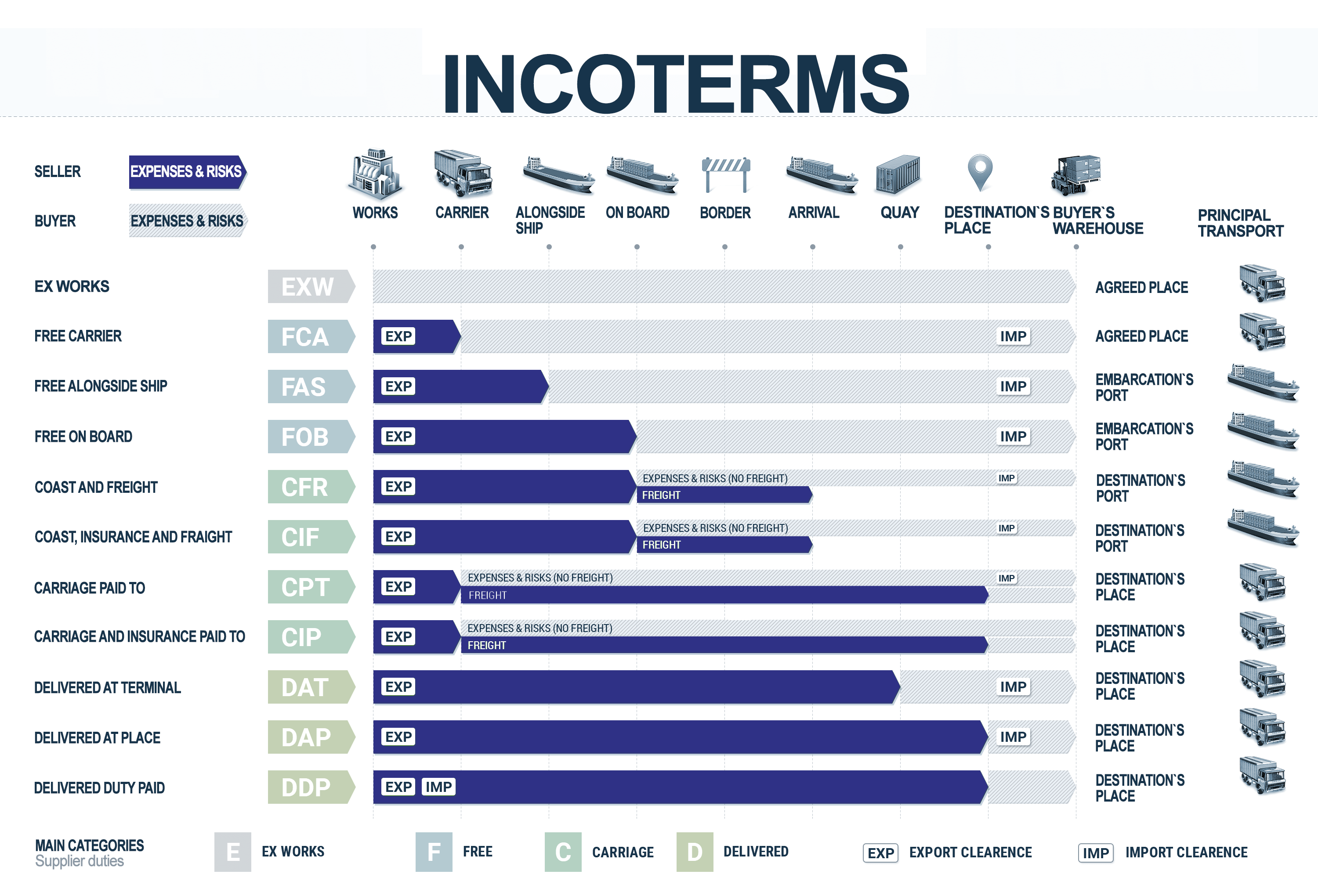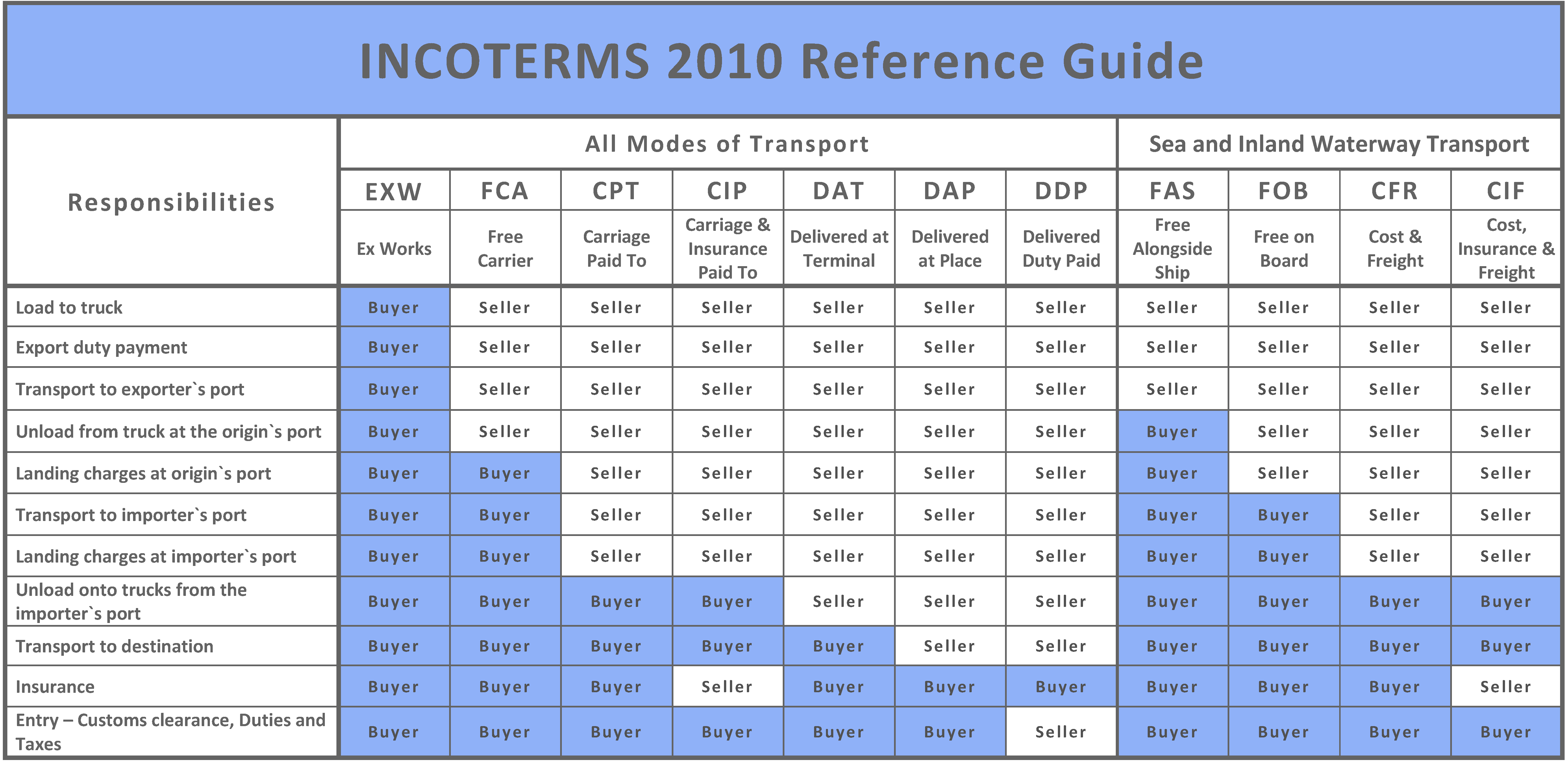Volume of transactions
Amount of deals
Clients
Countries
Now rules of interpretation of trade terms of INCOTERMS in edition of 2010 work (rules are relevant for 2018-2019).
The main difference from the previous version of 2000 is that now their action extends not only to international, but also to the internal turnover. Besides, the updated conditions of deliveries include two new abbreviations: DAP (delivery in point) and DAT (delivery in the terminal) which use allows the parties to define more precisely the moment of transition of risk from the seller to the buyer.
Drawing up and signing of the contracts of delivery of goods between the states demands from the parties of knowledge of special terminology. In order to avoid cases of incorrect interpretation of the concepts used in the sphere of foreign economic activity and, as a result, emergence of disputes it is necessary to be guided by the rules fixed in INCOTERMS 2010.
Concept INCOTERMS 2010
INCOTERMS 2010 is the document having the status of the international regulation published in the form of the dictionary containing a leaf of the terms, which are most widely used at signing of the contracts of external deliveries, and exhaustive determinations to them. Its main objective — standardization and optimization of conditions of international treaties of delivery for their reduction to compliance to laws of all countries contract parties.

INCOTERMS 2010 scope
The international trade terms are designed to regulate the following spheres of trade relationship:
Determination of the delivery date of goods.
Distribution between agreement parties of the transportation costs and other expenses connected with cargo hauling;
Settlement of conditions of transition of responsibility for the risks connected with death, loss or damage to goods in the course of transportation.

All terms, which are a part of INCOTERMS 2010, are designated in the form of a trigram abbreviation in which first letter indicates the moment and the place of transition of obligations from the supplier to the recipient:
E (departure) — Obligations pass to the buyer directly at the time of sending and, respectively, in the place of sending goods;
F (main carriage unpaid) — Transition point of obligations is the transportation departure terminal provided that the main part of transportation remains unpaid;
C (main carriage paid) — Payment of the main transportation is made in full, obligations pass into the moment of recipe of freight to the arrival terminal;
D (arrival) — “Full delivery” when transition of obligations is performed at the time of acceptance of goods by the buyer.
The operating conditions of deliveries of INCOTERMS 2010 contain 11 terms from which 7 are applicable to the cargo transportation performed by any kind of transport, and 4 — is exclusive to goods delivery methods by means of the sea transport of transportation (a sea transport and transport of territorial waters).
Universal terms:
EXW (ex works) is “Shipment at own expense” or category of transportation where a point free, that is the place of transition of responsibility from the supplier to the recipient, is directly the warehouse of the seller.
FCA (free carrier) is the Mode obliging the seller to deliver goods to the place of acceptance by its carrier in accordance with the terms of the agreement (payment of export duties — a duty of the supplier).
CPT (carriage paid to...) — Payment of the main part of transportation, which is to an arrival point, lies on the seller who, according to the agreement, performs the goods' delivery to carrier (expenses on insurance and customs fees, payments for import and a customs clearance on the buyer).
CIP (carriage and insurance paid to...) — the delivery Mode almost similar categories CPT, a difference consists in assignment of a bond for payment of an insurance on the seller.
DAT (delivered at terminal) is Expense allocation between the seller and the buyer: the first pays delivery to the terminal of arrival and export payments and insurance fees, the second — customs clearance and the rest of transportation to the destination.
DAP (delivered at place) is Delivery of goods to the destination with assignment of obligations for payment of the import duties and taxes to the state recipient on the buyer.
DDP (delivered duty paid) is the Goods' delivery to the destination with assignment of expenses on the seller in full.
The terms applied to the cargo transportation performed by sea and other sea transport:
FOB (free on board) to — Shipment of goods on the vessel belonging to the buyer or paid with it at the same time payment of a part of delivery to the terminal is included into a duty of the seller.
FAS (free alongside ship) is the Goods' delivery to the vessel of the buyer without shipment. The burden of payment of shipment and delivery lies on the recipient.
CFR (cost and freight) to — Cargo hauling to the port specified in the agreement. At the same time the buyer bears all expenses on delivery, payment of an insurance, unloading and transshipment works independently.
CIF (cost, insurance and freight) is the delivery Mode similar to category CFR, however payment of insurance premiums is assigned to the seller.
Liviera Investments Limited use many financial instruments to help you to achieve your economic goals.
We issue the following financial instruments:
 LC — Letter of Credit
LC — Letter of Credit
 DLC — Documentary Letter of Credit
DLC — Documentary Letter of Credit
 SBLC — Standby Letter of Credit
SBLC — Standby Letter of Credit
 BG — Bank Guarantee
BG — Bank Guarantee
 LG — Letter of Guarantee
LG — Letter of Guarantee
 POF — Proof of Funds
POF — Proof of Funds
 POA — Proof of Assets
POA — Proof of Assets
 POP — Proof of Product
POP — Proof of Product
Additional service:
 Services in the SWIFT system
Services in the SWIFT system
 Trade finance
Trade finance
 Factoring
Factoring
 Financial consulting
Financial consulting
 Trade consulting
Trade consulting
 IT consulting
IT consulting
 Packing credit
Packing credit
 Funding
Funding
 Monetization
Monetization
We very actively work with the following countries:
China, India, United Arab Emirates, Indonesia, Malaysia, Greece, United States of America, Canada, Nigeria, Singapore, Uzbekistan, Kazakhstan, Afghanistan, Ukraine, Georgia, Romania, Ghana, South Africa, Turkey and other countries.
Our team promotes your goals and helps you achieve high results.
We, Liviera Investments Limited, are interested in your pursuit of a prosperous business and we are doing our best to make your efforts a success.
Our team will apply the maximum knowledge and experience so that your company develops and functions harmoniously. We are fundamentally different from other companies, because we know how to correctly use financial instruments to achieve your high results: a lot of our own running and functioning projects made it possible to study the process of successful business operation.
Philosophy
Our experts are well aware that any business consists of a huge number of nuances that need to be taken into account and approach every task thoroughly. Success guidelines do not exist, and our experts with professional skills will help you to achieve success soon. We find innovative solutions that we offer at your service!
Expert knowledge
We know that any business is accompanied by various difficulties, but we are here to help you every step of the way. Our specialists have gone through similar professional situations and can assist you in building an effective business process. We have a wealth of experience and knowledge and are experts in our work!
Our network:
Great Britain, France, Germany, Russia, China, New Zealand, India, United Arab Emirates, Indonesia, Malaysia, Greece, USA, Canada, Singapore, Belgium, Uzbekistan, Kazakhstan, Afghanistan, Ukraine, Georgia, Romania, Ghana, South Africa, Turkey, Slovakia , Bulgaria, Hungary.
Liviera Investments Limited is your financial partner for all your trade finance projects.